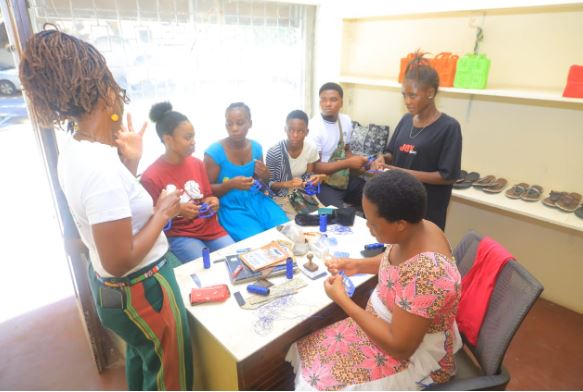
A group of youth in Malindi has initiated a unique project of turning trash into money by making products from recycled waste into items for export.
Their modest workshop, located within the busy central business district, buzzes with creativity and purpose.
The 20 young men and women are proving that innovation and sustainability can go hand in hand.
Mondo Solidare (MSO), the youth-led company, was born from a partnership between local youth and Italian conservationist Rita Valentini.
Together, they convert plastic waste, old tyres, worn jeans and other discarded materials into beautifully crafted handbags, shoes and jackets for export, especially to European markets.
Valentini, an experienced environmentalist, leads the design process and teaches the youth how to translate waste into fashion.
Once designs are finalised, the team sources raw materials from the waste collected locally, mostly plastics – and gets to work.
One of the company’s most popular products is a collection of handbags made from recycled plastic waste.
The bags come in a variety of sizes and styles, with the level of detail and craftsmanship involved in their production striking.
A visit to the MSO workshop reveals the intricacy of their work.
The process begins with the collection of plastic containers and other recyclable materials. These are washed, sorted and cut according to the specific design patterns. The pieces are punctured with small holes and handed over to the artisans, mostly young women, who use coloured crochet threads to stitch and embellish them.
Winnie Peter, a 22-year-old artisan, is one of many who have found purpose in the initiative.
She joined after completing secondary school and was waiting to join college. Seeing a neighbour involved in the work piqued her interest.
“I asked to be taught and that’s how I got started. I cut plastic into the required shapes, pierce holes and then crochet the design,” she said.
Peter estimates that she can make around 10 different designs a day.
“This work has changed my life. Before this, I relied on my parents. Now I can take care of myself and even help my family,” she added.
Samson Kahindi, another member of the team, works on the initial shaping of the plastic components. He cuts plastic from used oil bottles or broken basins and hands them over to the next stage for piercing.
“This job helps me with my personal expenses and also with family members at home,” Kahindi said.
Then there’s Charo Ngonyo, who previously crafted bags using tree seeds.
“Once I joined MSO, I was trained on how to use plastic instead. Now my work is more environmentally friendly and has better market appeal,” he said.
Creating a clean, green Malindi
The MSO youth aren’t working in isolation. They are part of the Progress Welfare Association of Malindi (Pwam), an organisation championing monthly clean-up exercises in collaboration with local stakeholders.
The goal is twofold: to keep Malindi clean and to collect valuable recyclable waste that feeds the local recycling economy.
Kate Mwikali, the Pwam chairperson, said the results have been transformative.
“Our clean-ups are no longer just about tidying up the streets. They’ve become a pipeline for job creation. People now understand that what they once considered trash can earn them an income,” she said.
According to Mwikali, the success of MSO has inspired more local entrepreneurs to jump into the recycling space.
“Since we began these efforts, at least five companies have emerged in Malindi that now buy waste materials,” she said.
Expanding the circular economy
Another key player in the movement is Anzuki Recycling Designers, led by entrepreneur Mike Nzuki. His company works in tandem with MSO to create export-ready fashion products.
The partnership has brought together 20 youth – 10 from MSO and 10 from Anzuki – who co-produce the final products destined for European markets.
The collaboration not only supports income generation but also promotes sustainable urban waste management, Nzuki said.
“With such initiatives, youth are able to get employment and at the same time waste management and circular economy is embraced,” Nzuki said.
Instant Analysis:
Recycling offers a powerful solution to both environmental degradation and youth unemployment. By converting waste into valuable products, communities can develop sustainable enterprises that generate income and build practical skills.
The process, from collection, sorting and design to production and marketing, creates numerous job opportunities, especially for young people. When supported by training, partnerships and market access, recycling becomes more than waste management; it becomes a livelihood.














